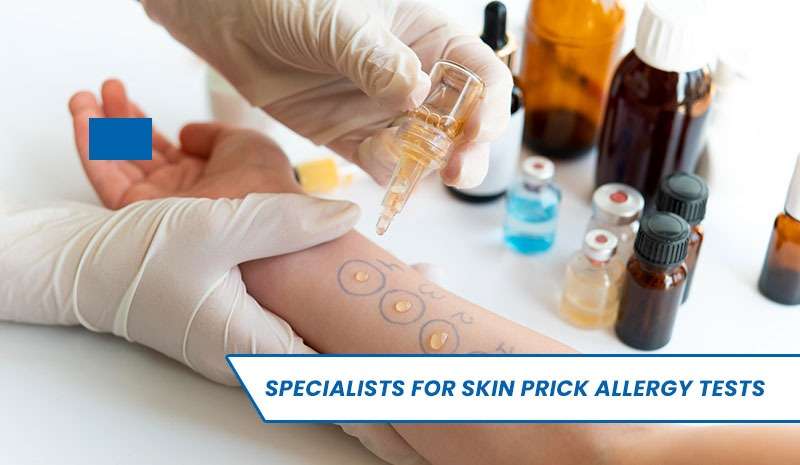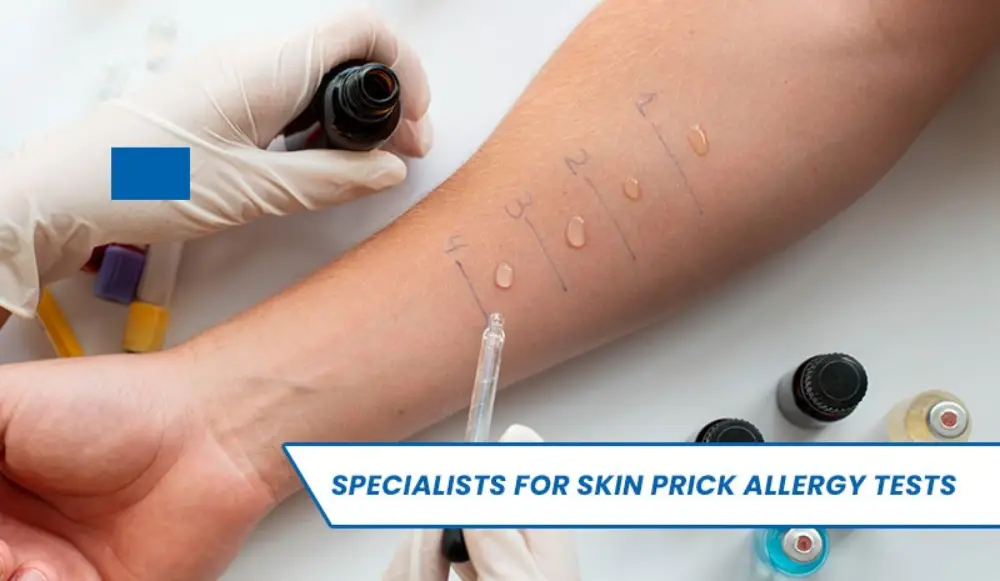Skin prick allergy tests have emerged as the first line of allergy diagnostic tests. Whether seasonal pollen allergy or food allergy, patients and doctors trust these tests widely. But are they really that accurate? Let’s delve into the science behind skin prick allergy tests, the factors that influence their accuracy, and expert insights from Ahmedabad’s specialists for skin prick allergy tests. Let’s uncover the truth about these diagnostic tools.
What Are Skin Prick Allergy Tests?
Skin prick tests (SPTs) are a minimally invasive diagnostic method to identify potential allergens that may trigger reactions in the body. Here’s how they work:
- Preparation: A doctor applies small drops of potential allergens (e.g., pollen, dust mites, foods) on your forearm or back.
- Pricking: A tiny lancet pricks the skin just under each drop, introducing the allergen to your immune system.
- Reaction Observation: After 15–20 minutes, the doctor observes for any raised bumps (wheals) or redness, which indicate a potential allergic reaction.
How Accurate Are Skin Prick Allergy Tests?
Skin prick tests are generally reliable, but their accuracy is not absolute. Studies estimate that their sensitivity (ability to detect true positives) ranges from 70% to 90%, while their specificity (ability to avoid false positives) ranges from 50% to 90%.
Here’s what affects their accuracy:
1. Type of Allergy
Skin prick tests are most accurate for detecting environmental allergens (like pollen, mold, and pet dander) and food allergies. However, they are less reliable for diagnosing drug or non-IgE-mediated allergies (reactions not involving immunoglobulin E antibodies).
2. Allergen Extracts
The quality of the allergen extracts used during testing plays a critical role. Standardized, high-quality extracts ensure more accurate results, while poorly prepared extracts may lead to false negatives or positives.
3. Patient-Specific Factors
Certain conditions or medications can skew results:
- Antihistamines: Suppress reactions, leading to false negatives.
- Skin Conditions: Severe eczema or psoriasis can make it difficult to conduct the test on affected areas.
- Immune Response Variability: People with weaker immune systems might show reduced reactions.
4. Interpretation by Specialists
The expertise of the doctor interpreting the results significantly influences the accuracy. Specialists trained in allergy testing, such as those in Ahmedabad, carefully consider your medical history alongside the test results to ensure accurate conclusions.

Limitations of Skin Prick Allergy Tests
Despite their many advantages, skin prick tests have some limitations:
- False Positives: Sometimes, a test indicates an allergy even when there’s no clinical reaction. This can happen due to hyper-reactivity of the skin.
- False Negatives: Rarely, the test may fail to detect an allergy, especially if the allergen extract is inadequate or the reaction is delayed.
- Not Definitive for Severity: Skin prick tests indicate sensitivity, but they don’t predict how severe an allergic reaction might be.
Insights from Dr. Manish Goyal, Specialist for Skin Prick Allergy Tests in Ahmedabad
As one of Ahmedabad’s leading specialists for skin prick allergy tests, Dr. Manish Goyal emphasizes the importance of accuracy in diagnosing allergies. Here’s what he has to say about the process:
- Holistic Diagnosis: “Skin prick tests are an essential tool, but we always combine the results with a detailed medical history and patient symptoms for a comprehensive diagnosis,” explains Dr. Goyal.
- Local Allergens: Ahmedabad has its unique allergen profile, including common triggers such as ragweed pollen, dust mites, and certain legumes like peanuts and chickpeas. Dr. Goyal tailors the tests to include allergens prevalent in the region.
- Follow-Up Testing: In borderline cases, Dr. Goyal often recommends additional tests, such as specific IgE blood tests, to confirm the diagnosis and ensure patients get the most accurate results.
- Patient Education: “Understanding your allergies and how to manage them can significantly improve your quality of life. My goal is to empower patients with the knowledge they need,” says Dr. Goyal.
When Should You Consider a Skin Prick Allergy Test?
You should consider getting tested if you experience:
- Chronic Sneezing, Runny Nose, or Congestion: Could be due to pollen, mold, or dust mites.
- Unexplained Skin Rashes or Hives: May indicate food or insect allergies.
- Asthma-Like Symptoms: Allergens can often exacerbate breathing difficulties.
- Recurrent Digestive Issues: Certain food allergies can manifest as stomach pain or diarrhea.
Tips to Prepare for a Skin Prick Test
Before undergoing a skin prick test, follow these tips to ensure accurate results:
- Avoid Antihistamines: Stop taking antihistamines at least 5–7 days before the test.
- Inform Your Doctor: Share your full medical history, including current medications and conditions.
- Choose the Right Specialist: Opt for an experienced allergist like Dr. Manish Goyal who specializes in conducting and interpreting skin prick tests.
 +919979891672
+919979891672 











No Comments